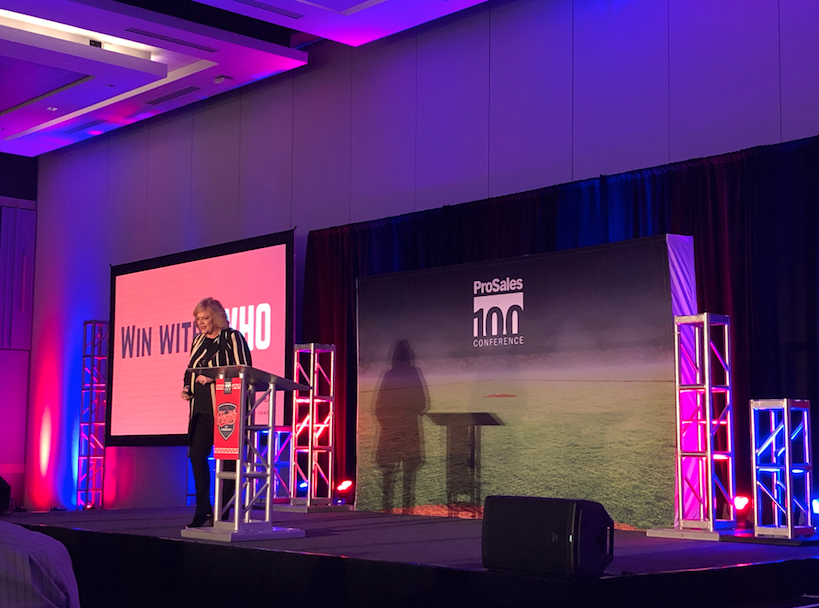When making additions to teams, it is important to make a distinction between hiring and selecting talent, Dee Ann Turner, CEO of Dee Ann Turner LLC told attendees at the 2020 ProSales 100 Conference in Arlington, Texas. Hiring is routinely cited as one of the biggest challenges in the industry, and Turner said companies likely will have to disrupt the hiring process to succeed.
Using the vernacular “hiring people” has a qualitative connotation and this mindset can result in making decisions to fill numbers. Using the mindset of “selecting talent” is more qualitative and enforces the mindset of finding talent with the skills and abilities to succeed, rather than make up numbers.
Turner, pulling from her 30-year experience with Chick-Fil-A, extended her message of selecting talent with an analogy to movie casting directors. If hiring managers look at themselves as casting directors for the company with every role viewed as a starring role, it is easier to enforce the talent selection framework.
“If you want to build a team and ‘win with who’ then you have to remember: people decisions are the most important decisions you make as a leader,” Turner said during her keynote presentation “Secrets to 50 Years of Growth: Chick-fil-A’s Talent Lead.”
“Of all those people decisions, selection is the most important one. The decisions that come after that are all not right unless [selection] is right.”
When making decisions selecting talent, Turner stressed the importance of three Cs: character, competency, and chemistry. A company’s culture is the sum of all of the team’s characters, Turner said.
“Our character is formed through our behavior and the judgment we use and the decisions we make. A person with outstanding character has proven over and over that they make the right choices,” Turner said. “Too often we’re under pressure to get slots filled and in our hurry to avoid these delays that hurt our business, we neglect to select people with strong character.”
Mistakes with hires with characters who don’t match the company’s character can result in public ramifications. The integrity of a company can be impacted by those who do not align with the organizational mission and purpose. Turner also said that factors beyond the workplace, “off the clock” behavior, can have a negative influence on behavior and atmosphere in the workplace.
Hiring managers should also assess the competency of candidates. Turner said it is important to find employees who have the ability to complete needed tasks and instill confidence.
“How to find people with strong competency is by looking for evidence through behavior-based interviewing,” Turner said. “We know past performance is the best predictor of future performance. So, we want to ask specific questions that can only be answered by revealing the presence or absence of very specific competencies.”
Regarding chemistry, Turner said it is important to evaluate how well candidates will work with other team members and contribute to the team. It is beyond matching existing tendencies of team members and searching for team members to bring diverse perspectives to the organization as well as collaborate with others. “Most executives with poor office chemistry would say they were totally unaware of it. And the positive influence you want to have on the organization can be sabotaged by having the wrong chemistry among your team members,” Turner said.
Turner said betting on talent can allow companies to “win with who.” A remarkable culture combined with extraordinary talent is the simple equation for an amazing customer experience, according to Turner.
Turner stressed that when hiring it is important to be cognizant of the feelings of Millennials and Generation Zers. Turner said individuals in this age group also need to know there are places to go within a company, so stressing the paths they can take within the company is an important element to retaining these employees.
“People have to have opportunities to aspire to, it helps you enhance your culture if you can promote from within.” Turner said. “When I think about Millennials and Gen Z, they have to know they have places to go and you won’t keep them if every [new hire] is coming from the outside and you’re not promoting from within.”

